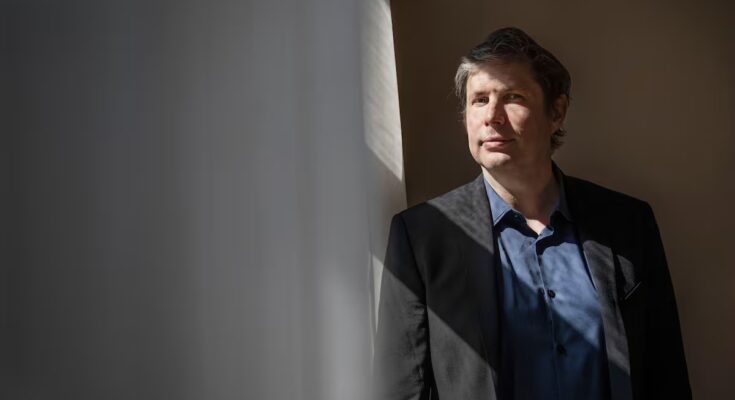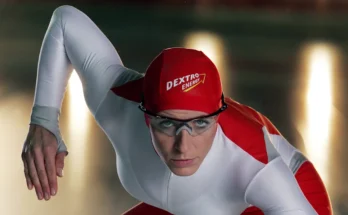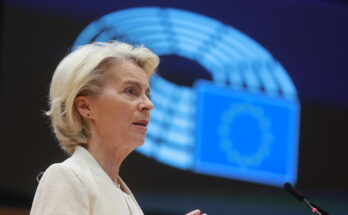It is the fate of every German writer: to end up writing about Nazism. You can delay it, you can think it will be different, but there’s a good chance that eventually the problem, Him The question that has defined Germany, Europe and human consciousness since 1945, sooner or later forces itself on you and you have no choice but to face it.
Daniel Kehlmann, Austrian and German, had already written about historical figures such as Alexander von Humboldt or medieval figures such as Till Eulenspiegel, and one day, in a conversation between writers, his friend Zadie Smith told him: “After the age of 40, there are inevitable themes.” “I always thought,” Kehlmann explained, “that when I found the right story, I would do it.”
He’s 50 now and he’s finally found it.
Kehlmann landed this morning from New York, where he lives, although he always keeps one foot in Berlin. If you have dysrhythmiait is not noticeable. From the restaurant where we spoke, on the banks of the Spree River, you can see the Friedrichstrasse station, which during the Cold War was the border between the two Berlinyes, both GermanysBoth Europe. But today we are talking about another trauma, another German wound.
Kelhmann publishes in Spanish The director (Random House, translated by Isabel García Adánez), the fictionalized story of GW Pabst, master of the great cinema of the Weimar Republic with Fritz Lang and FW Murnau, discoverer of Greta Garbo, exiled to Hollywood after the arrival of the Nazis and protagonist of a twist that makes him a singular case. It is an exemplary case: a message that is projected from the 1940s to the present day.
When Pabst’s colleagues crossed the Atlantic from Germany, he took the opposite route. Things had not gone well for him in Hollywood and his ailing mother lived in Austria. The Third Reich offered him financial means and creative freedom – or what he understood as such – that, in Hollywood, he could not even dream of. And it stayed.
When he discovered this story, Kehlmann saw it clearly: “This is the novel I want to write!” The result is a fast-paced fiction, with Kehlmann’s usual linear style, a mix of Austrian lightness and German depth, with hilarious scenes that seem taken from a classic Hollywood comedy and others that are frighteningly expressionist.
Pabst neither sold his soul to the devil nor allowed himself to be seduced by Hitler, at least ideologically. He wasn’t a Nazi. He allowed himself to be seduced in other ways. With money and threats. If he said yes, in one scene he suggests Joseph Goebbels, Minister of Propaganda and true megaproducer of Nazi Hollywoodhe would have all the means and the best actors and technicians at his disposal. If he had said no, it would have ended, he who in Weimar times was known as Pabst the Redin the concentration camp. The director of Pandora’s Box AND Western Front 1918 He was someone who couldn’t say no, a conformist who in every decision he made thought that yes was the lesser evil, until the lesser evils piled up.
“I can understand it,” says Kehlmann, and the reader ends up understanding it too. “Even though this is a moral failure on his part, I, as the narrator, am ultimately on his side.” “He was a weak man,” she adds, “except when he made his films.”
Pabst was not Leni Riefenstahl, author of Hitler’s mesmerizing propaganda documentaries. In those years he made three films with the Nazis: The comedians, Paracelsus AND The Mollander case who is lost and whose disappearance is the McGuffinsthe intrigue that activates the narrative mechanism. These films were not (consciously) propagandistic. In Paracelsusthe sequence of the charlatan who makes the people dance spasmodically can be read as a portrait of Nazism, as the critic J. Hoberman observed in The New York Times.
“What happens to Pabst in the novel is that he never meets the devil, makes him an offer and has to say yes or no,” says Kehlmann, “but rather takes a series of small steps, and in each of them there is a good reason for deciding what he decides. In this sense he is the anti-Faust. Evil never appears as great evil, but always as small evils and small concessions that can be defended. And one small concession leads to another.”
The director “It’s not a parable,” warns Kehlmann. “I didn’t write it, at least consciously, to say anything about the world today,” he says, although he wrote it during Donald Trump’s first presidency and that influenced him. “It must be said that it was nothing compared to now,” he says.
The novel came out two years ago in German, but when it was published in countries like Hungary or the United States, governed by leaders with authoritarian tendencies, it was read as a warning from the past. where it says Pabst could be read the magnates of Silicon Valley. “On the one hand I’m happy, as an author, that it’s read as something that’s really relevant to specific situations in your life,” Kehlmann says. “On the other hand, it scares me that a book set in the Third Reich is suddenly seen as something so relevant now.”
The use of fiction to tell a story with a real character made the Pabst family uncomfortable, and led Kehlmann to specify, in a final note, that Jakob, the director’s son in the novel, is fictional. He defends Vargas Llosa’s idea of the “truth of lies”, the novelist’s freedom to invent. To the point of imagining him in his latest film, The Missing The Mollander casePabst used slave laborers as extras.
“There’s a reason why, morally, I think it’s justifiable, and that is, first of all, that I’ve made it clear that this is a fiction,” he says, and points out that the entire story of this film is also a fiction, since no one has ever seen it, so it can only be imagined. “And secondly, because in the Third Reich practically no films were made without forced labor.” That is to say, the chances that this or something similar happened are high, although, the author insists, we cannot know whether this was exactly the case in those shots.
Fiction novel, then. Is it historical? From Measuring the world dedicated to him two decades ago, this label has remained attached to Kehlmann, which he rejects. And even more so in this book, where characters from the world of cinema appear that her parents – the Austrian director Michael Kehlmann and the German actress Dagmar Mettler – knew firsthand. They are environments and stories that his father told him. Michael Kehlmann grew up in a Jewish family in the Third Reich and, at the end of the war, spent time in a concentration camp. It is not an exotic world or a remote past for him: “All this is very close to me.”

The director
Daniele Kehlmann
Translation by Isabel García Adánez
Random House, 2025
376 pages, 22.90 euros


